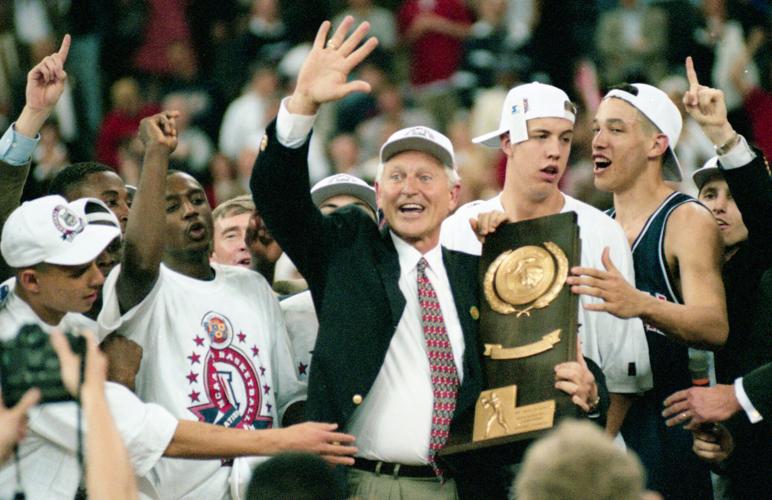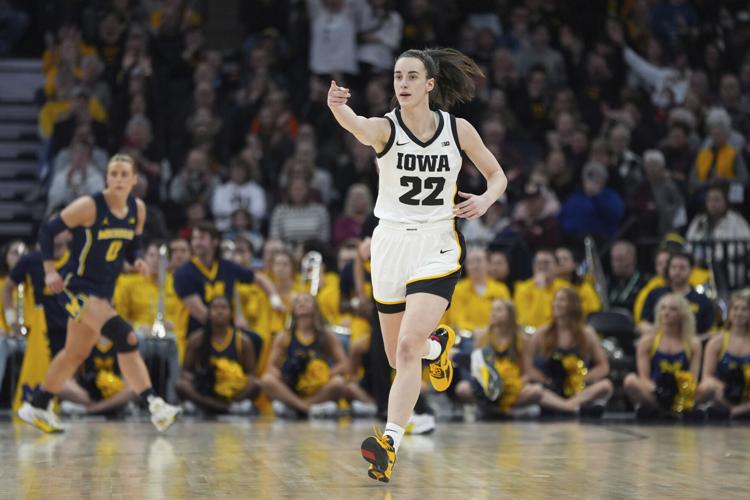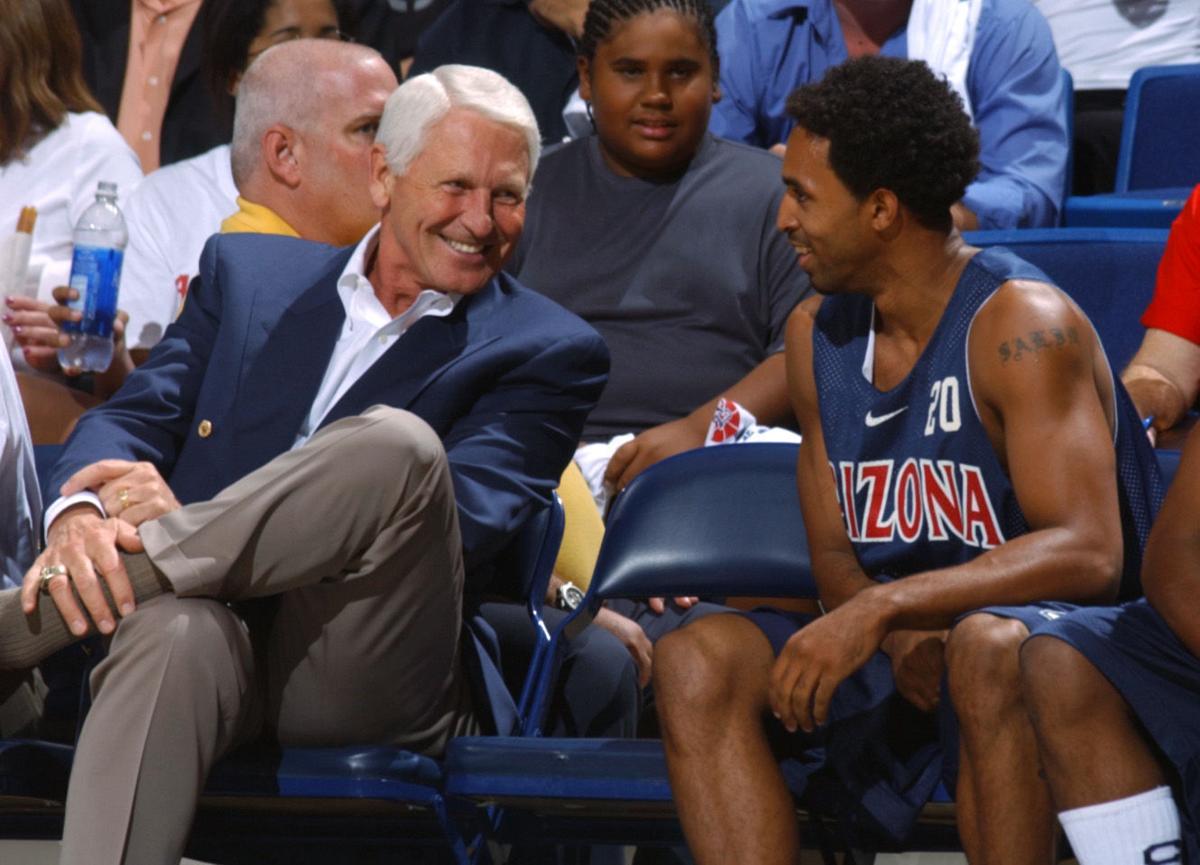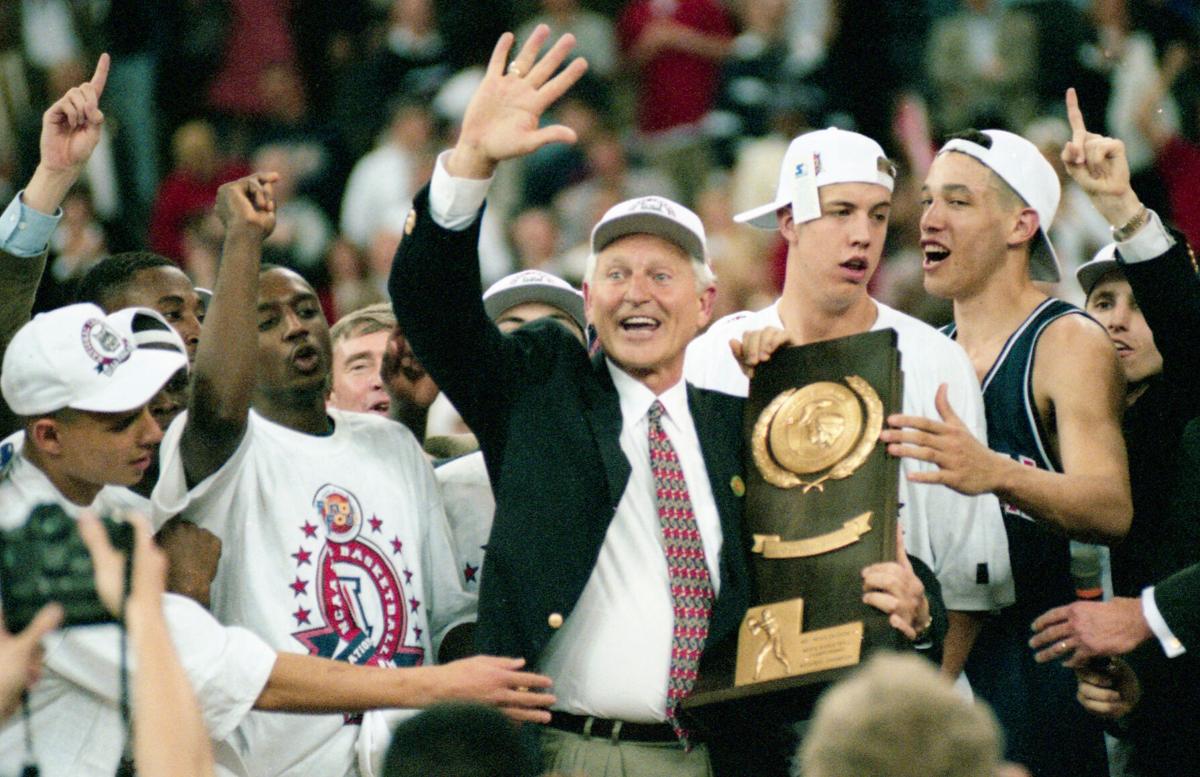The Star's longtime columnist on the best of the best from the Pac-12 since 1978; Arizona's top NCAA figures; men's and women's Final Four predictions; a first-time in the First Four for Adia Barnes' Wildcats, and more. Miss part I? Head on over to start from the top.
Before NCAAs get rolling, a final look at Pac-12’s best, 1978-24
One man’s choices as the Pac-12’s top men's teams, players, coaches and even referees before the league dissolves for good after this year's NCAA Tournament:
Best player: Sean Elliott, Arizona. He was the league’s only consensus national player of the year in that span, 1989. Runner-up: None of the one-and-done types, such as ASU’s James Harden and UCLA’s Kevin Love played long enough to establish a legacy. My runner-up would be Oregon State’s Gary Payton, a two-time consensus All-American and the league’s top defensive player of the era.

Arizona's Sean Elliott looks for an open man during the 1989 Sweet 16 against UNLV. There was no love lost between the Wildcats and Rebels in that era.
Best coach: Lute Olson, Arizona. He won 327 league games. Stanford’s Mike Montgomery won 280, and OSU’s Ralph Miller 204.
Worst coach: Probably UCLA’s Walt Hazzard, who ran the Bruins and their grand tradition into the ground in the mid-’80s, going 21-12, 15-14, 25-7 and 16-14 and getting fired, according to UA president Charles Young, for being booed too loudly at the Pac-10 Tournament at McKale Center.
Best team: Arizona’s 35-3 Final Four club, 1988. The Wildcats won by a margin of 20.7 points per game, still a Pac-12 record. Runner-up: UCLA’s 31-2 national champions of 1995, a shade above Oregon State’s 26-2 team of 1981, a defense-strong club that opened 26-0 before a last-second Kansas State shot eliminated them at the NCAA Tournament.
Worst team: Take your pick; Oregon State went 3-28 in 2022, including 1-19 in conference and 6-25 in 2008, going 0-18 in conference. Next: Arizona’s 4-24 team of 1983, which went 1-17 in the league, losing to, among others, Illinois Wesleyan at McKale Center.
Best referee: Verne Harris and John Higgins both officiated eight Final Fours, with Dave Libbey at seven and Randy McCall with five. Booker Turner — remember him? — worked five Final Fours and belongs t the Harris-Higgins class. Libbey? He was a me-first personality, I’d pass on him.
Best game: UCLA 89, Arizona 87, 1992 at McKale. Darrick Martin’s last-second jumper broke the UA’s 71-game home-court winning streak in a game that matched the No. 2 Bruins and No. 5 Wildcats. It was Duke-Carolina and then some.

Arizona's Salim Stoudamire puts up the game-winning shot in the final seconds to beat Oklahoma State 79-78 in the 2005 NCAA Tournament's Chicago Regional semifinal on March 24, 2005, at Allstate Arena in Rosemont, Illinois.
Arizona’s most notable NCAA Tournament figures
• The Wildcats scored 61 points in the second half to beat Iowa 99-79 in a 1988 Sweet 16 game in Seattle, extending a 38-34 halftime lead against Olson’s old school.
• Luke Walton, a do-it-all power forward, is Arizona’s career assists leader in NCAA games (67), a period, 2001-03, in which the Wildcats played in the Final Four, the Elite Eight and the Sweet 16.
• Arizona set a school NCAA record by shooting 66% to beat No. 3 seed Oklahoma State in the 2005 Sweet 16 in Chicago, with Salim Stoudamire swishing a 3-pointer with 2.4 seconds remaining in a 79-78 win.
• Arizona’s 30-point scores in an NCAA game: Derrick Williams had a 32-point, 13-rebound double-double to eliminate No. 1 seed Duke in a 2011 Sweet 16 game won 93-77. Khalid Reeves scored 32 in a 1994 opening-round game against Loyola-Maryland and 30 two days later in a win over Virginia; Sean Elliott scored 31 in the 1988 Final Four loss to Oklahoma; Herman Harris scored 31 in a 1976 Sweet 16 loss to UNLV; Bennedict Mathurin scored 30 in a 2022 second-round win over TCU; Miles Simon scored 30 in the 1997 national championship game against Kentucky and 30 the same year in an Elite Eight game against Providence.

Houston coach Kelvin Sampson cut down one net after the Cougars won the Big 12 regular-season championship on March 9. will he cut down another after this year's NCAA Tournament?
One man’s men’s Final Four
• Iowa State. The Cyclones survived and thrived in the nation’s most difficult conference, beating Houston, BYU (twice), Baylor and Kansas, and won’t be awed by an Elite Eight game against UConn.
• Purdue. All those early Boilermaker NCAA exits of previous years won’t come into play in Zach Edey’s final Big Dance.
• Arizona. A likely Sweet 16 match against Baylor might be the most difficult challenge; Baylor played the nation’s toughest schedule, according to Kenpom.com. A possible Elite Eight showdown against North Carolina? Call it 50-50.
• Houston. The Cougars have gone 30-4, 33-4 and 32-6 the last three seasons. They are legit, feared for their defense and toughness.
National champ: Houston

Arizona coach Adia Barnes embraces star guard Aari McDonald after the Wildcats qualified for the Final Four on March 29, 2021.
Arizona still a relative newbie in women’s NCAA
This is Arizona’s fourth consecutive NCAA Tournament, a school record, which pales next to the 25 consecutive NCAA berths secured by the UA’s men’s teams, 1985-2009.
Yet Adia Barnes has been up to the fight. She has gone 6-3 and isn’t one to back down to a challenge, any challenge, even with an eight-player roster.
In the Pac-12, only Washington State (four NCAA tournaments) has less big-stage experience than the Wildcats, which means Barnes is probably at the start of a long and productive run. Here’s how Pac-12 women’s teams stack up in NCAA Tournament history:
• Stanford, 100-33, 36 appearances
• USC, 29-15, 17 appearances
• UCLA, 23-18, 18 appearances
• Arizona State, 21-17, 17 appearances
• Washington, 21-19, 19 appearances
• Colorado, 19-15, 15 appearances
• Oregon, 17-17, 17 appearances
• Oregon State, 16-12, 12 appearances
• Utah, 12-19, 19 appearances
• Cal, 13-14, 14 appearances
• Arizona, 13-10, 10 appearances
• WSU, 0-4, four appearances
Arizona has run the gauntlet in its NCAA history. It has been eliminated by five of the most successful coaches in the game’s history: by UConn’s Geno Auriemma in 1998; Rutgers’ Vivian Stringer in 1999; Tennessee’s Pat Summitt in 2000; Stanford’s Tara VanDerveer in 2021; and Maryland’s Brenda Frese, a former UA player, in 2023.
‘First Four’ relatively new for women’s bracket
In 2022, the NCAA finally expanded its women's basketball tournament from 64 to 68, matching the men’s field. The men added a First Four and grew to 68 in 2011.
Arizona’s berth in the First Four as an 11 seed has a brief history. In 2022, Dayton defeated DePaul and Missouri State defeated Florida State in the First Four. Dayton was then eliminated by Georgia. Missouri State lost to Ohio State.
In 2023, a First Four team won its first game in the field of 64: Mississippi State defeated Creighton and then reached the Round of 32, where it lost to Notre Dame. In the other First Four game of ’22, St. John’s eliminated Purdue but then lost to North Carolina.

The Auburn bench celebrates as time runs out on Louisiana Tech to end the NCAA semi-final game in Tacoma, Washington, on April 1, 1989. Auburn beat Tech 76-71 to advance to the championship game against Tennessee. Pictured, from left: head coach Joe Ciampi, Lynn Stevenson (23), Chantel Tremitiere, and assistant coach Joanne Palumbo.
Auburn used to be women’s hoops bluebood
Including an 8-8 conference mark this year, Auburn went 15-48 the last four seasons in SEC play and hasn’t been a contender in the conference's women’s basketball conversation since 2009. But the Tigers' history in women’s hoops is compelling.
From 1988-90, the Tigers went 31-2 overall, then 32-3, 32-2 and 29-7, reaching the NCAA championship game three years in succession. From 1983-96, coach Joe Ciampi was one of the game’s most feared and respected coaches.
Auburn’s one tie to Arizona is that Ciampi coached Auburn to a 1988 Final Four victory over future Arizona head coach Joan Bonvicini, then coaching at Long Beach State. Bonvicini’s ’88 team led the NCAA in scoring at 101 points per game, but lost 68-65 in the Final Four semis to Auburn.
Bonvicini became Arizona’s head coach in 1991; she would recruit Adia Barnes, the 1998 Pac-10 player of the year, and lead the UA to its first seven NCAA Tournaments in school history.

With an NCAA-record 3,771 points and having Iowa back in the national championship picture, Hawkeyes guard Caitlin Clark (22) really is as good as it gets
Iowa’s rise to prominence a long time coming
Now that Iowa’s women’s basketball team has become must-watch TV, it can’t be said it was a short journey to the top.
Hawkeyes coach Lisa Bluder was hired away from Drake in June 2000 and paid significant dues, not winning a Big Ten title until 2008. She didn’t reach a Sweet 16 until 2015 and finally broke through at the Final Four a year ago.
She broke through, obviously, being in the right place at the right time after all those years. The nation’s best and most visible player (men or women), Caitlin Clark, played high school basketball in nearby Des Moines, Iowa, and committed to the Hawkeyes after visiting Notre Dame and Iowa State, and rejecting an offer from then-powerhouse Oregon.
How good is Clark? From a Pac-12 perspective, she is as good as it gets.
Clark has scored an NCAA-record 3,771 points. The Pac-12’s career scoring leader is Washington's Kelsey Plum, 3,527, followed by Stanford's Chiney Ogwumike, 2,737. Aari McDonald, who played a year at Washington and three more on the court at Arizona, is at 2,314.

Just a freshman, USC guard JuJu Watkins (12) has already shown she's women's college basketball's next huge star.
One man’s guess at the women’s Final Four
• South Carolina. After coaching at Temple for nine years — best finish: round of 32 — Gamecocks coach Dawn Staley began her USC coaching career with records of 10-19, 14-15 and 18-15. Then she got it rolling; the undefeated Gamecocks won it all in 2017 and 2022. The former NCAA career steals leader is the standard by which today’s coaches are measured.
• Iowa. Millions of American TV viewers would be crushed if there is not a Caitlin Clark component to this year’s Final Four.
• Southern California. When Juju Watkins, the national Gatorade Player of the year, 2023, signed with USC over South Carolina and Stanford, everything changed for a program that finished 10th in 2022 and had not won the league title since 1994. Watkins scored 50 in a win over Stanford in February and led the Pac-12 with a 27-point scoring average, second-most in league history.
• Texas. If the Longhorns are still as good as they looked when drilling Arizona 88-75 in McKale Center on Dec. 13, their No. 1 seed is justified.
National champ: Southern California
Iowa star Caitlin Clark has passed Pete Maravich to break the record for the most points scored by a Division 1 basketball player in history. Clark, who needed 18 points to pass Maravich’s tally, recorded the feat with a 35-point effort in her team's 93-83 win over Ohio State. "It's really crazy to think about. Honestly, if you would have told me that before my college career started, I would've laughed in your face and been like, 'No, you're insane'," said Caitlin Clark. The 22-year-old broke the record at the end of the first half with two free throws after a technical foul was called on Ohio’s Cotie McMahon. Clark is coming to the end of her college career after opting to enter the 2024 WNBA draft instead of using her COVID waiver to stay in Iowa. The 2023 AP Player of the Year is now 199 points behind Pearl Moore, who holds the AIAW small-college women’s record of 3,884 points. Iowa moves to 26-4 and breaks the Buckeyes’ 15-game winning streak, with both teams occupying the top two seeds in the Big Ten.












